Nigeria's human rights commission said on Friday an investigation had found "no evidence" that the Nigerian military deliberately attacked women and children or carried out secret abortions in its fight against an Islamist insurgency in the northeast.
The Nigeria Human Rights Commission, which is appointed by the government, has been investigating three Reuters reports published in December 2022 which found the Nigerian military ran a secret, systematic and illegal abortion programme and massacred children in the northeast, where the insurgency has been going on for 15 years.
The commission said in a report that it carried out its investigation over 18 months and interviewed 199 witnesses, including from the military, former militants, women who had been freed from Boko Haram captivity and local and foreign aid agencies. Not all of them were named.
Among those interviewed for the investigation were Chief of Defence Staff Chris Musa, who at the time of the reports led the counterinsurgency campaign in the northeast, his predecessor General Lucky Irabor and former Chief of Army Staff Lieutenant General Farouk Yahaya.
The seven-member panel which conducted the investigation included a retired major general, Letam Wiwa, who previously served as head of military intelligence. He is the younger brother to Ken Saro-Wiwa, the Niger Delta activist who was executed by the military in 1995.
"There is no evidence to establish that the Nigerian military conducted a secret abortion programme in the north-east, ending pregnancies of thousands of women and girls freed from insurgent captivity," said the report, which was released at a press conference in the capital Abuja.
The Nigerian military previously denied the findings in the news agency's reports. Military spokesman Edward Buba did not immediately reply to a request for comment on Friday. Musa, the Chief of Defence Staff, did not immediately respond to attempts by Reuters to contact him by telephone on Friday.
Responding to the report's conclusions, a Reuters spokesperson said: "We stand by our reporting which fully met our standards for independence, accuracy and impartiality under the Reuters Trust principles."

REPORT'S FINDINGS
The human rights commission's report found that medical registers from five civilian hospitals in northeastern Nigeria showed that the facilities carried out just under 6,000 abortions between 2013 and 2022 but it concluded that there was no record of forced and illegal abortions in military or civilian facilities.
It added that access to military records of many sorts, including postings of personnel and hospital-related data, was a major challenge.
"We could not get data from the military. We tried our best and we discovered that records were not properly kept in virtually all the military medical institutions that we visited," the General Counsel to the panel, Hilary Ogbonna, told the press conference.
The human rights commission said the panel found no evidence to show that the army deliberately targeted children, but had found proof that the military attacked the Abisari community on June 18, 2016, leading to the death of 18 people, including women and children.
Reuters reported, based on dozens of witness accounts and documentation, that a military abortion programme involved terminating at least 10,000 pregnancies among women and girls, many of whom had been kidnapped and raped by Islamist militants.
In another Reuters report, more than 40 soldiers and civilians told the news agency they had witnessed the Nigerian military killing children or had seen children's corpses after a military operation.
The NHRC said Reuters failed to appear before the investigating panel, adding that this "raises doubts on the source of the information and credibility of its allegations."
On April 3, 2023, a lawyer for Reuters News wrote to several commission members to state that Reuters would be unable to appear before the panel consistent with the news agency's commitment to independence and impartiality under the Reuters Trust Principles.
The Reuters letter said: "Thus, while we appreciate the hard work of the NHRC, it is fundamental that Reuters not voluntarily assist in the investigation of the NHRC — or any other governmental authority."
Before sending the letter, Reuters tried to arrange for an outside lawyer to appear before the panel to explain its position and received no response.
In the past, some rights activists have accused the NHRC of failing to hold the government to account, citing the agency's inability to secure prosecution of senior Nigerian officials accused of rights abuses – a lack of accountability underscored in United Nations, opens new tab and U.S. State, opens new tab Department reports.
However, the commission also has previously been critical in some reports against the government.
Latest Stories
-
I want to focus more on my education – Chidimma Adetshina quits pageantry
35 mins -
Priest replaced after Sabrina Carpenter shoots music video in his church
49 mins -
Duct-taped banana artwork sells for $6.2m in NYC
59 mins -
Arrest warrants issued for Netanyahu, Gallant and Hamas commander over alleged war crimes
1 hour -
Actors Jonathan Majors and Meagan Good are engaged
1 hour -
Expired rice saga: A ‘best before date’ can be extended – Food and Agriculture Engineer
1 hour -
Why I rejected Range Rover gift from a man – Tiwa Savage
1 hour -
KNUST Engineering College honours Telecel Ghana CEO at Alumni Excellence Awards
2 hours -
Postecoglou backs Bentancur appeal after ‘mistake’
2 hours -
#Manifesto debate: NDC to enact and pass National Climate Law – Prof Klutse
2 hours -
‘Everything a manager could wish for’ – Guardiola signs new deal
2 hours -
TEWU suspends strike after NLC directive, urges swift resolution of grievances
2 hours -
Netflix debuts Grain Media’s explosive film
3 hours -
‘Expired’ rice scandal: FDA is complicit; top officials must be fired – Ablakwa
3 hours -
#TheManifestoDebate: We’ll provide potable water, expand water distribution network – NDC
4 hours

